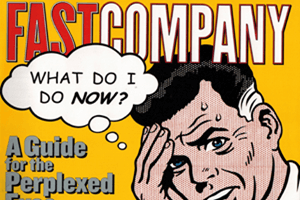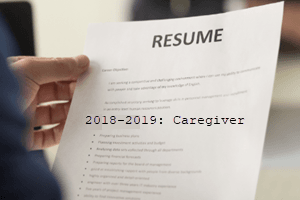Question
How can we screen headhunters? I know you’ve spoken at length about the difference between a real headhunter and those that are just casting a huge net and hoping to find someone to apply. Do you have any advice about what to look for, or what types of questions I can ask these headhunters off the bat to know whether they’re worth my time or not?
Nick’s Reply
 You already know the odds that a job solicitation is a real opportunity are tiny, and that it’s far more likely you’re dealing with someone who will waste your time — again! Most job solicitations are about as helpful as an e-mail pitching a tinnitus cure.
You already know the odds that a job solicitation is a real opportunity are tiny, and that it’s far more likely you’re dealing with someone who will waste your time — again! Most job solicitations are about as helpful as an e-mail pitching a tinnitus cure.
If the solicitation e-mail or text reads like boilerplate, delete it. If the caller is a fast-talking salesperson, hang up. It’s that simple.
“Uh, Nick, how does that help me?” you’re wondering. “I don’t want to miss out on any good opportunities.”
If you’re going to work with a headhunter, first you must qualify them — and that means you’ve got to test them before you can believe anything they say, and before you put yourself in their hands.
How to screen headhunters
If the caller sounds like an earnest business person politely asking for your help with an assignment to fill a job, you should keep talking — because there really are a few good headhunters out there. If you pay attention, you’ll find the best headhunters demonstrate high standards of conduct and reveal the same qualities they look for in candidates.
- They are easy to work with because they are straightforward. They speak clearly and directly. They are not secretive or cagey.
- They don’t waste time playing games or putting on airs. They make you feel special, rather than imply they are.
- If they start with an e-mail or text, they quickly follow up with a call or Zoom.
- They are not in a hurry. They take time to talk. They pay attention. They answer your questions.
- They are knowledgeable about their business, their client, the job they’re trying to fill and about you.
- Good headhunters don’t call on anyone blindly. They already know quite a bit about your background — not just what they found on LinkedIn — or they wouldn’t contact you.
- A good headhunter reveals integrity by being honest and trustworthy. They will do what they say — including returning your e-mails and calls.
- A good headhunter is conscientious. You’ll see this in the questions they ask. Rather than ask for your resume, the headhunter will learn about you by talking with you extensively.
- They will exhibit a sincere interest in your work and abilities, and in your interests and goals.
- They will give useful advice if you ask for it.
- Finally, a good headhunter is effective. If you’re a possible candidate for their client, you’ll get an interview in short order. If you’re not a fit, they’ll say so. They won’t lead you on.
Does that sound like any headhunter who has solicited you? I’m sure you’re shaking your head: What headhunter is going to do any of what’s in that list?
Right-O. Just a very few will. That’s why it’s so important to test or screen headhunters for those rare qualities immediately and every time. Most will fail, and that’s why you should test them all.
Try this test
When you’re done communicating (hopefully, talking) with a headhunter who contacted you, ask yourself, Could this headhunter write an adequate resume about me based strictly on our phone call?
I sometimes write a candidate’s resume just like that, after a phone call, and I provide it as a summary to my client. It’s a good test of my own grasp of a candidate’s credentials and value.
If a recruiter’s call is so cursory that you don’t think they could write your resume from it, that reveals an unskilled headhunter or an inadequate recruiting call. A headhunter who merely requests your resume or just asks you to fill out an application is no better than a job posting on the Internet. They’re going to waste your time. You don’t need them.
When you meet a good headhunter, you’ll know it from the characteristics listed above, and you’ll recognize someone with whom you’ll want to cultivate a long-term relationship.
Let’s get real: screen headhunters
You are likely shaking your head and maybe laughing at what I’ve said. “Nick, Nick, Nick! Let’s get real! The good headhunters you’re talking about don’t exist!”
A few good headhunter do exist — but they’re quite rare. So, why do most people who get bombarded with job solicitations respond to virtually any headhunter solicitation and waste time? (Loads of people fall for out and out job scams.)
The answer is easy, and embarrassing: It’s lazy, wishful thinking. People don’t want to do the hard work of finding the right job. They want Mommy — a headhunter — to serve it up to them. But they don’t bother to screen headhunters. So they comply with too many silly solicitations and complain when these turn out badly.
Let’s get real. There really are very few good headhunters out there. That’s no excuse to entertain the worst ones when you know better. Think of the hours you’ll save that you could better invest in actually finding the right job opportunity yourself!
(For more on this thorny topic, please check out How to Work With Headhunters… and how to make headhunters work for you.)
What percentage of headhunters (or recruiters) that contact you offer good, realistic job opportunities? How do the best ones behave? What behaviors tip you off to the worst?
: :




 There is an awful lot of marketing and, well, B.S. in what many of these firms are selling. It’s no accident that they throw a lot of implied promises at you very quickly and want their fee in advance.
There is an awful lot of marketing and, well, B.S. in what many of these firms are selling. It’s no accident that they throw a lot of implied promises at you very quickly and want their fee in advance.
 There has been a spate of articles online about
There has been a spate of articles online about 
 There used to be a book titled something like 2,800 Interview Questions & Answers. Even today, you can find books that will automate your job interviews with canned repartee. These books feature 701 interview questions (and “best answers), or 201, or 189, 101 — or, How many interview questions you got???
There used to be a book titled something like 2,800 Interview Questions & Answers. Even today, you can find books that will automate your job interviews with canned repartee. These books feature 701 interview questions (and “best answers), or 201, or 189, 101 — or, How many interview questions you got???


 I hate cover letters. I don’t know how to write a decent one, all the online help I’ve seen is banal garbage, and frankly I’d rather chew on broken glass than go through the agony of trying to think up a bunch of “toot-your-own-horn” baloney to spit out in a cover letter. But in the process of applying for jobs, oftentimes a cover letter is required. Any suggestions?
I hate cover letters. I don’t know how to write a decent one, all the online help I’ve seen is banal garbage, and frankly I’d rather chew on broken glass than go through the agony of trying to think up a bunch of “toot-your-own-horn” baloney to spit out in a cover letter. But in the process of applying for jobs, oftentimes a cover letter is required. Any suggestions?






 Nick’s Reply
Nick’s Reply